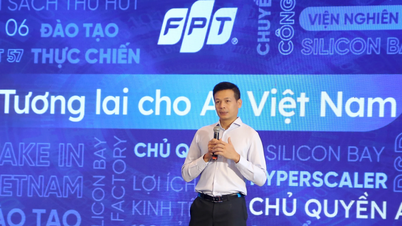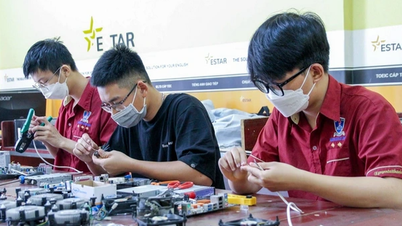(CLO) 5.5G technology marks a new step forward, improving speed, reliability and expanding the potential for artificial intelligence, smart devices, and the Internet of Things, promoting digital growth in the modern world .
The convenience of working remotely and managing tasks via smartphones has become a given. But back in the 2000s, using a handheld device to access the web, send emails, or post on social media over a 3G mobile network was a major breakthrough.
When 4G came along, Internet speeds were up to 10 times faster than 3G, enabling high-definition video and online gaming to flourish. 4G also saw the birth of the Internet of Things (IoT), connecting computing devices in everyday objects, allowing people to remotely control machines and share data quickly.
The next frontier, 5G, will not only increase speed and reliability but also usher in the era of smart cities and autonomous vehicles, with a profound impact on sectors such as banking, retail and healthcare.

Faster speeds, larger connection sizes and significantly reduced latency are among the improvements that 5.5G mobile network technology brings this year. Photo: Internet
5.5G will help accelerate the advancement of GenAI
This year, the 5.5G network officially launched, marking an important milestone in the telecommunications industry. With significantly higher throughput, lower latency, and superior reliability compared to 5G, 5.5G not only enhances connectivity but also promotes global digital development.
This is the foundation for realizing the extended Internet of Things (IoE), where not only devices but people, processes and data are seamlessly connected.
One of the areas that will most clearly benefit from 5.5G networks is artificial intelligence (AI), especially generative AI (GenAI). Introduced in late 2022, GenAI is capable of generating new content from text, images to music based on huge data sets.
Many industries such as marketing, financial services, and software have quickly adopted GenAI to improve productivity and innovation. For GenAI to work effectively, 5.5G networks are indispensable with high-speed data transmission and low latency, meeting the needs of real-time processing and interaction.
For example, in China, Apollo Go is Baidu's autonomous ride-hailing service. The service offers a robo-taxi experience, where users use an app to hail a self-driving car, just as they might use a traditional app-based ride-hailing service like DiDi or Meituan.
Self-driving robotaxes rely on massive data processing. Each vehicle uploads 100 gigabytes (GB) of data per day from 12 4K cameras and eight light and radar sensors to build real-time models of the environment and enable decision-making.
This data-intensive process requires advanced 5G networks capable of near-instantaneous data transmission at speeds of up to 100 megabits per second and latency of less than 50 milliseconds, ensuring seamless and secure operations in complex urban environments.
In the near future, Apollo Go can rely on 5.5G networks to transmit real-time data as well as integrate the latest AI technology to enhance perception, positioning, decision-making and control capabilities.
These advances not only benefit the transportation industry but also extend to areas like logistics, where wearables and facial recognition technology can optimize inventory management processes and reduce errors.
Additionally, 5.5G-enabled wearables are evolving beyond the usual fitness apps. They allow healthcare providers to monitor patient conditions and intervene promptly. New AI smart glasses can even read lips with over 95% accuracy in noisy environments, opening up new communication possibilities.
The future is an AI world
Many countries and businesses are rapidly deploying 5.5G networks to take advantage of its benefits. China Mobile, one of the world's largest carriers, has deployed commercial 5.5G networks in more than 100 cities, supporting advanced applications such as UHD streaming and cloud gaming.
International Data Corporation predicts that by 2028, the number of AI-enabled smartphones will exceed 900 million globally, demonstrating that AI and seamless network connectivity will play a central role in how we interact with devices and technology.
Beijing Unicom and Huawei have worked together to deploy the world's first 5G-Advanced intelligent network, covering many key locations in Beijing such as stadiums, schools, scenic areas, subway stations and residential areas, and providing convenient services such as navigation, ride-hailing and emergency assistance.
The network ensures comprehensive 5G coverage and 85% 5G-Advanced coverage in Beijing's Fourth Ring Road and Beijing Municipal Administrative Center, supporting services such as immersive video, UHD streaming, and cloud gaming.
In addition, the renovated phone booths connected to the 5G-Advanced network now provide convenient one-click access to navigation, ride-hailing, and emergency services, improving the daily lives of Beijing residents. This is a testament to the great potential of the 5.5G network in improving the quality of life and promoting innovation.
Li Peng, senior vice president of Huawei, commented: "We are entering an era where information is created, shared and used in completely new ways. This not only poses challenges but also opens up unprecedented opportunities."
Hoai Phuong (according to SCMP, Modern Diplomacy)
Source: https://www.congluan.vn/cong-nghe-55g-se-mo-ra-mot-ky-nguyen-moi-trong-the-gioi-ky-thuat-so-post329674.html



![[Photo] Many people in Hanoi welcome Buddha's relics to Quan Su Pagoda](https://vphoto.vietnam.vn/thumb/1200x675/vietnam/resource/IMAGE/2025/5/13/3e93a7303e1d4d98b6a65e64be57e870)
![[Photo] President Luong Cuong awarded the title "Heroic City" to Hai Phong city](https://vphoto.vietnam.vn/thumb/1200x675/vietnam/resource/IMAGE/2025/5/13/d1921aa358994c0f97435a490b3d5065)
![[Photo] Prime Minister Pham Minh Chinh receives Ambassador of the French Republic to Vietnam Olivier Brochet](https://vphoto.vietnam.vn/thumb/1200x675/vietnam/resource/IMAGE/2025/5/13/f5441496fa4a456abf47c8c747d2fe92)

![[Photo] President Luong Cuong attends the inauguration of the international container port in Hai Phong](https://vphoto.vietnam.vn/thumb/1200x675/vietnam/resource/IMAGE/2025/5/13/9544c01a03e241fdadb6f9708e1c0b65)




























































































Comment (0)